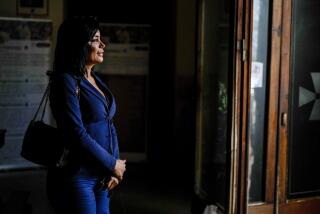Opus Dei seeks to make everyday life holier
- Share via
Julia Boles, 46, lives in Arcadia with her lawyer husband and their nine children, ages 5 to 20. She also manages to attend Mass daily, set aside two times a day for prayer and, with her children, pray the rosary.
“People say, ‘Nine kids? How do you handle that and go to Mass?’ I say, ‘How could I do this without the Mass?’ ”
Boles is a member of one of the most talked about, least understood Catholic organizations in the world: Opus Dei, which means “work of God” in Latin.
Although the face of Opus Dei in “The Da Vinci Code” is a murderous masochistic monk -- a fiction, the group’s members say -- it is Boles who typifies the group’s American demographic: She’s a woman. The majority of the 190 members in L.A. are women, as are slightly more than half of the 3,000 members in the U.S.
There are no monks. And only 2% of the organization’s nearly 90,000 members worldwide are priests, one of whom was Jose Gomez, the newly named successor as archbishop to Cardinal Roger Mahony. Gomez is the only priest to come up through Opus Dei who has been made a U.S. bishop.
Yet, even ignoring the distortions of “The Da Vinci Code,” critics have pointed to the group’s historic connection to right-leaning governments and its secretiveness. Brian Finnerty, spokesman for Opus Dei in the U.S., said the group takes no political positions.
Seton Hall law professor John Coverdale said the organization’s goal is to offer lay Christians a path toward a holier life, without becoming a priest or a nun. “People would see their work as a professor or a journalist or mother or whatever they are as something to offer to God and something that they need to try to do well,” said Coverdale, 69, a lay member of Opus Dei.
“The main idea is to help members come closer to God in their everyday activities,” said Finnerty.
“It’s not a bunch of pious things,” said Boles, whose husband and two eldest children (UCLA students John and Ginny) are members too. “I’m chasing after kids, I’m trying to get meals on the table. . . . All of those things are precious in God’s eyes if they are done with love. If you try to do it as well as you can, for God’s glory, with concern for your neighbor and mine, it’s wonderful.”
Members go to daily Mass, set aside time to pray and sometimes fast or sacrifice a treat or pleasure as a way of honoring Christ.
And then there is corporal mortification, though not as portrayed in “The Da Vinci Code,” they say. “It’s not a bloody whipping of oneself,” said Coverdale. “It’s more an annoyance.”
He wears a leg chain with dull spikes -- called a cilice -- around his upper thigh a couple of hours a day while praying. It’s designed to be uncomfortable but not draw blood. And once or twice a week, during a prayer, he whips himself on his buttocks with a type of rope they refer to as “the disciplines.”
“It doesn’t particularly hurt, maybe it stings a bit,” said Coverdale.
Father Paul Donlan of the Opus Dei center near UCLA follows a similar routine. The idea is to bring oneself closer to Jesus Christ’s suffering as he wore a crown of thorns and carried his cross.
“It’s a gesture,” said Donlan. “The real discipline of getting to bed on time, getting to work on time, saying no to an extra glass of wine, boy, that is far more painful than any of this.”
Most married Opus Dei members do not practice corporal mortification, at least not as literally as the single and celibate members. “For me, it’s mortification to get up early and get that prayer in at 6 a.m.,” said Boles, laughing.
Donlan, 72, says people interested in joining are shepherded through stages of determining whether they are truly committed to this intense way of daily life.
And leaving is easy, according to Donlan. He refers to the founder of the organization, the Spanish-born priest Josemaría Escrivá, who was canonized in 2002: “St. Josemaría used to say the door is narrow to get in and wide to get out.”
More to Read
Sign up for Essential California
The most important California stories and recommendations in your inbox every morning.
You may occasionally receive promotional content from the Los Angeles Times.











